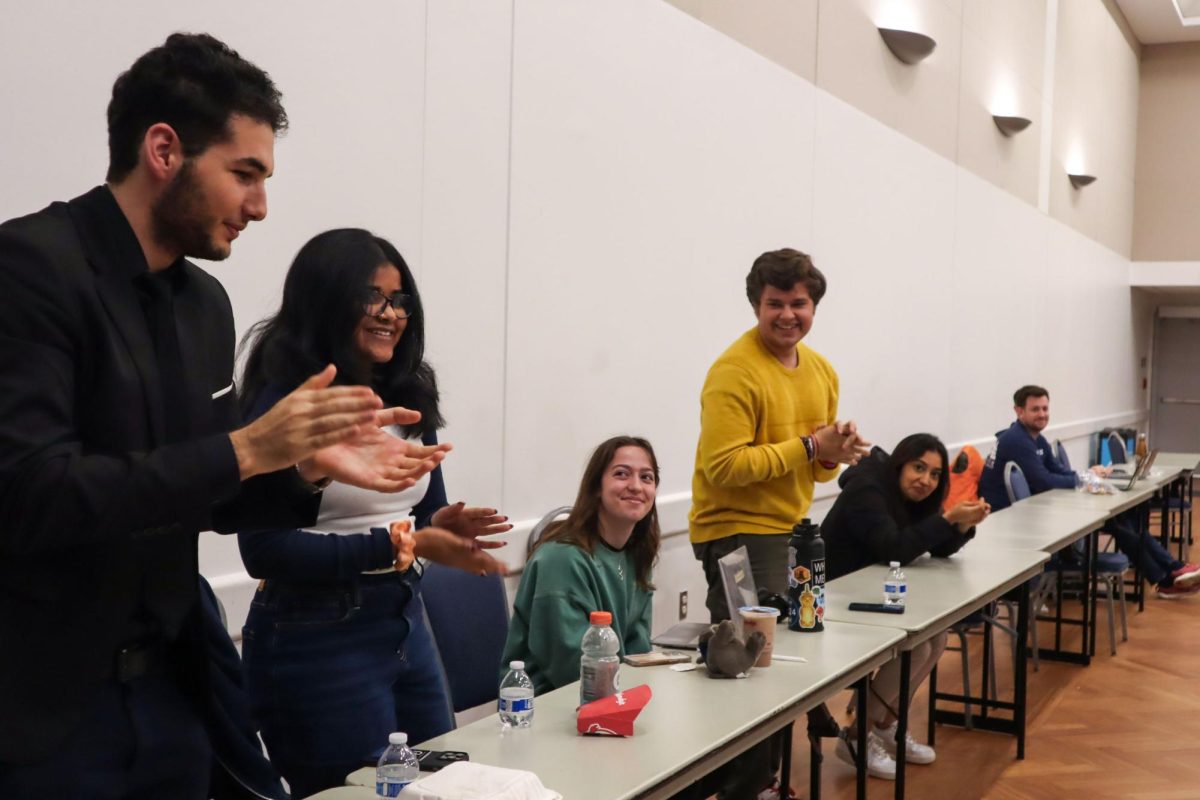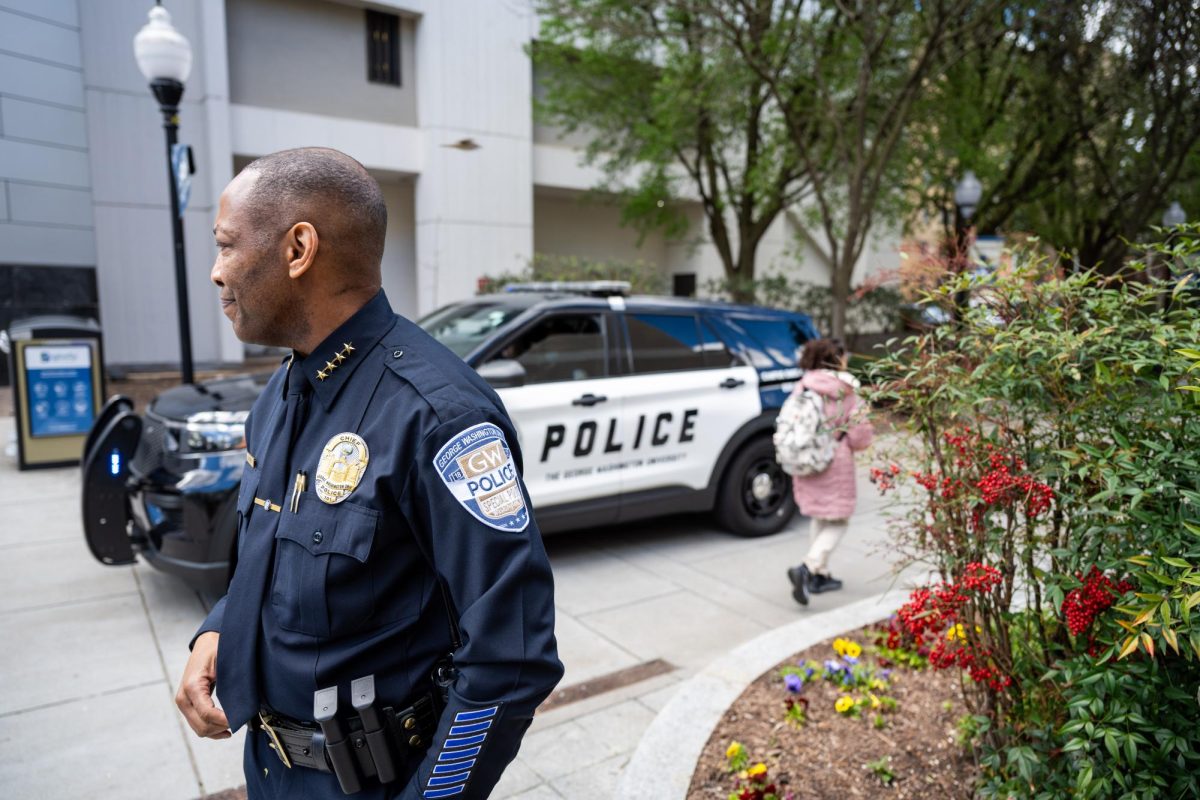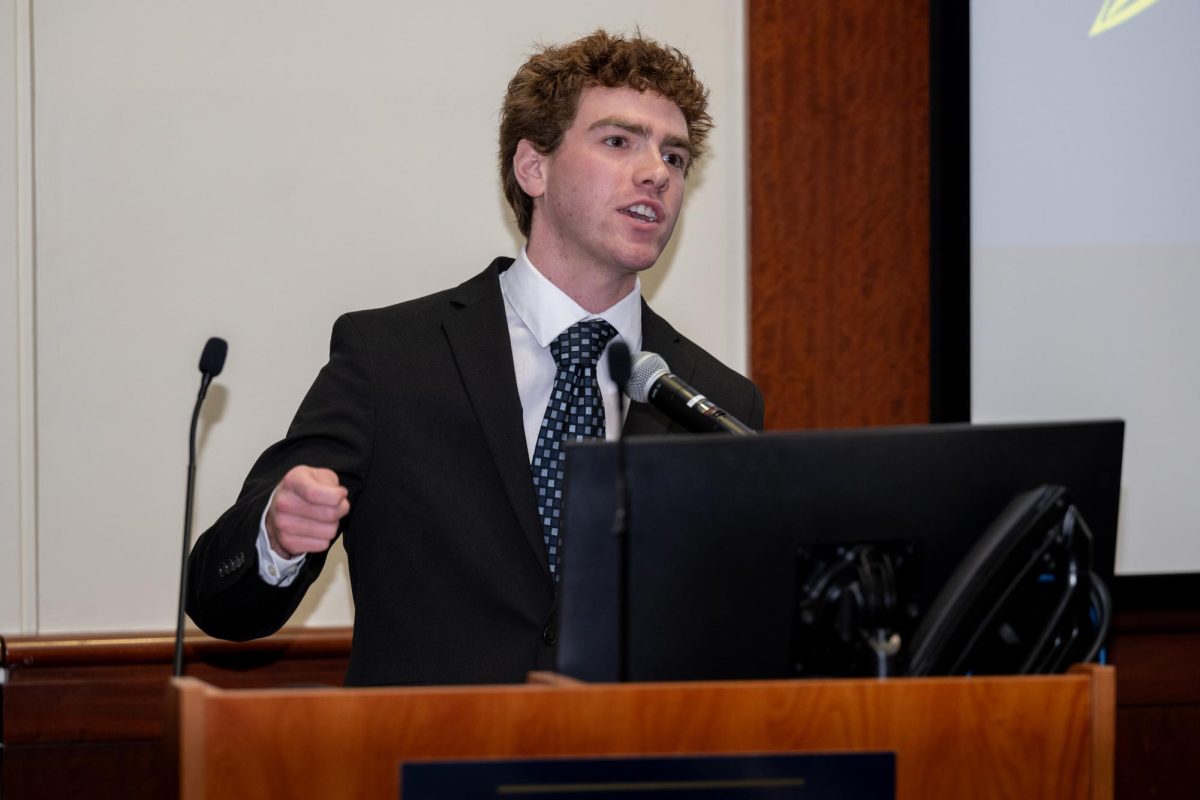The Student Association Senate voted to create a pair of special councils that will advocate for Jewish and Israeli students and Arab, Muslim and Palestinian students during a meeting Monday.
Senators voted 29-0-2 to pass the executive order, written by SA President Arielle Geismar, SA Vice President Demetrius Apostolis and SA Sen. Ethan Fitzgerald (CCAS-U), that calls to form two councils amplifying the students’ voices to University officials following tension and threats to student safety on GW’s campus after the outbreak of the Israel-Hamas war in October. Before its passing, Geismar amended the bill to change the councils’ titles to specify their representation of Palestinian and Israeli students and added clauses to recognize the pain and violence that members of the communities are facing.
Geismar renamed the proposed “Council of Muslim Student Experience” to “Council of Palestinian and Muslim Student Experience” and “Council of Jewish Student Experience” to “Council of Jewish and Israeli Student Experience.” Other amendments included changing the wording that introduces the bill from “recent events in the Middle East” to “violence and bombing of Palestine in the Gaza Strip and terrorist attacks and violence in Israel.”
She said she did not previously “properly delineate” the names of affected identity groups represented through the councils and made the amendments after conversations with students prior to the meeting Monday.
“As a Jewish woman, I am intimately familiar with the hatred and antisemitism that has occurred on campus and really appreciate your support in voicing and fighting for your communities,” Geismar said during her presidential report, holding back tears.
The councils will put on cultural programming, conduct surveys on “student life, opinions, and desires” and meet with University President Ellen Granberg, Dean of Students Colette Coleman and a leader from the Multicultural Student Services Center, per the bill. Geismar will give $1,000 of her executive budget to each council, which will both include 10 to 18 students and ensure that all students feel “safe and heard,” according to the bill.
Geismar said GW is the first university to create an initiative like the order, meaning there is no rubric or guidebook on how to support students. She said she is “gutted” by the students who are in pain right now and refused to make a “half-assed statement” without any action to support it, despite being unable to change the events occurring around the world.
“Given these amendments, I hope that you’ll take a moment to reflect on what we can actually offer students and ensure that we are giving students everything we can,” Geismar said.
During public comment, a student who did not provide their name said creating two committees centered around religion “effectively obscures” the true nature of the issue — which centers more on the color of one’s skin — and will fail to keep students safe.
“The rise in hate crimes is largely committed to brown individuals across the country regardless of their religious identity, ethnic identity or political beliefs,” the student said.
Geismar said last week that the two councils will replace then-SA President Christian Zidouemba’s Task Force to Combat Antisemitism, which he spearheaded in early 2023 during his term as president. Under the new councils, students will be able to directly advocate to University officials, instead of student leaders expressing opinions for the students, she said.
Sabrina Soffer — a Hatchet opinions writer and the former commissioner of Zidouemba’s antisemitism task force — said during public comment that she encourages senators to pass the bill because the councils pertain to conduct, not religion and identities. She said the councils will help ensure that students can wear keffiyehs and Stars of David with pride.
“We cannot have progress if we don’t take the first steps and I believe that this initiative, although the preliminary bill might be imperfect, we can all work together and see how we can create a safer environment for every single student on this campus,” Soffer said.
The creation of the two special councils follows on-campus student protests, vigils and walkouts in support of Israelis and Palestinians since October, as well as reports of on-campus Islamophobia and antisemitism and GW’s suspension of a pro-Palestinian student group. The bill states that GW has “room to grow” in their support of the Jewish, Muslim, Israeli and Palestinian students and that campus antisemitism and Islamophobia has threatened students’ right to advocacy and safety. One of Geismar’s amendments recognizes the pain shared by students who are facing online and in-person doxxing and acts of discrimination.
Granberg and Provost Chris Bracey released a statement to The Hatchet on Tuesday applauding the SA’s effort to improve GW’s shared community and “enrich the quality, equity, and authenticity” of the student experience at GW. Granberg and Bracey said they look forward to continued partnership on this initiative, per the statement.
“This initiative aligns with the University’s approach to addressing the challenges uncovered over the past several weeks and our ongoing work to improve the entire GW community’s health, safety, and wellbeing,” the statement reads.
Senators also unanimously passed an act that will distribute a survey asking for students’ opinions on GW’s dining facilities. The bill’s sponsor, SA Sen. Izzy Brophy (CCAS-U), said the initial survey questions will address the University’s leading dining issues, including the variety of available foods, the handling and labeling of food at dining halls and unmet religious and dietary needs.
Brophy said while Halal-certified foods are present on campus, Kosher certified foods are not, and instead, students are offered “Kosher friendly” options, which are not certified as kosher by an agency. Brophy said the survey will include five additional questions for Kosher respondents to answer regarding their satisfaction with the dining facility.
SA Sen. Noor Khalil (SMHS-G) proposed a friendly amendment to the survey to add the equivalency of further questioning for those keeping a Halal diet because many students are “unaware” of Halal dining options on campus and feel limited in their on-campus options.
“I’m confident that this survey will allow the committee to learn more about student dining experiences and create recommendations to the dining office that serve all students’ needs,” Brophy said.
Senators also unanimously passed the FY2024 General Allocation Part II Act to over approve $256,000 in funding for student organizations for the spring semester. Nathan Nguyen, the director of the Legislative Budget Office, said while the LBO cannot meet the full needs of all student groups, they have worked to make improvements like changing the language in the allocations process to make it easier for organizations to apply for funds.
“The language that we’ve changed has made it a lot simpler for orgs to understand as well as our increased outreach efforts in terms of communicating that information, so I believe that was very helpful,” Nguyen said. ”I’ve gotten some better feedback from orgs about that.”
Senators also voted to pass the Senate Caucus Creation Act, amending SA bylaws to allow senators to form caucuses. SA Senate Chairperson Pro Tempore Amy Cowley (ESIA-G), who sponsored the act, said caucuses would empower senators from underrepresented groups in the SA, including graduate students and women, by allowing them to organize.
”The ultimate goal, however, is to provide a forum and opportunity for increased collaboration across committees for our Senate and for future iterations,” Cowley said.
GW Reproductive Autonomy and Gender Equity Co-Presidents Stephanie Spector and Maddy Niziolek delivered a presentation on the organization’s foundation to encourage the SA to partner with them in future initiatives like further persuading University officials to offer medication abortion through the Student Health Center.
“What we’re hoping to work on with you guys in the future is really promoting comprehensive sexual and reproductive health care here on campus,” Niziolek said.
The senate voted to table the Remote Attendance Act, since it has not yet been voted on in the Governance and Nominations Committee. This act would request an update to University policy to allow students to attend classes virtually, for any reason without penalty, for up to 25% of all their classes.
The senate unanimously confirmed first year Anirudh Hebbatam for Senate Secretary and second year graduate student Abhisri Ramesh for Auditor General. Senators also unanimously confirmed first year graduate student Naomi Moshier for Executive Secretary of Graduate Student Life.
The Senate also unanimously passed the Nathan 4 the Nguyen Appreciation Resolution to commemorate Nguyen’s last senate meeting.
Hannah Marr contributed reporting.











